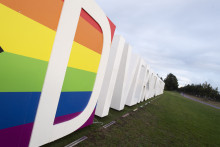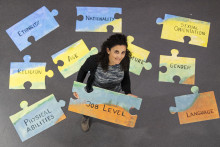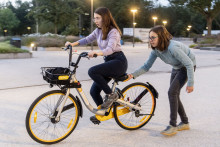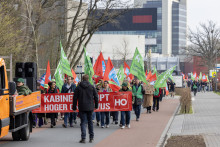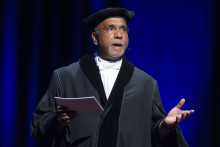Why did you decide to organise this eight-part series?
Diekel: ‘I’ve been thinking about it for quite a while before I submitted a proposal to the Incentive Fund last autumn. The idea is based on the German concept of a Ringvorlesung; this basically means that people from different backgrounds shed their light on one specific topic. In the case of our lecture series, we’re focusing on the theme of diversity, equity, and inclusion (DEI, ed.) in the production of scientific knowledge.’
Why this topic?
‘During my studies and first year of my PhD trajectory, topics surrounding the theme were raised quite often. During discussions, you could tell people have very different levels of expertise, while the topic of DEI has its influence on our everyday way of working in academia. What we hope to achieve with these lectures is to not only give people the opportunity to engage in discussions and connect with each other, but also to have them reflect on their own positionality within science.’
'This self-reflection can be quite uncomfortable. It can even lead to someone questioning their own career and fundamental beliefs' - Felice Diekel
What is this concept of positionality?
‘It refers to how an individual's social identities – such as race, gender, class – and their experiences shape their perspectives and understanding of the world. In the context of academia and science, this means reflecting on your own social identity and lived experiences, and consider how they influence the ways we produce, interpret, and value scientific knowledge.’
Why is that important?
‘I believe it’s important that you are willing and able to reflect on your own position and who you are as a scientist or student and how you are part of a certain structure. Addressing these topics fosters empathy, encourages collective responsibility, and enhances our capacity to navigate differences effectively. If we’re able to critically examine our roles as researchers and students within society, we can improve both academic outcomes and societal impact. That kind of self-reflection can be quite uncomfortable. It can even lead to someone questioning their own career and fundamental beliefs. That’s also why we set up a guideline, to ensure a safe space and a respectful discussion.’
'Talking about these topics is even more important than ever with this anti-intellectual movement going on' - Felice Diekel
Lectures touch on topics like colonialism, feminism, race and class… It seems like these are the kinds of topics that Donald Trump is actively prosecuting Harvard for. What are your thoughts on that?
‘If I would have done this five years ago, a series on DEI in science would probably have been considered less controversial. Then again, it would feel weird not to organise it. If anything, I would say that talking about these topics is even more important than ever with this anti-intellectual movement going on. There are people who are experts on these kinds of topics and have been working on them for years. We’re recognizing them and their knowledge and providing a platform – and inviting the audience to engage with them. The topics of the lectures range from more foundational topics on decolonizing research, race, class, and gender in science, to more applied lectures on using the theory in research or making mistakes in public.
Attendance-wise, is this series more aimed at people who are already involved in the topic, or are you aiming for a broader audience?
‘Definitely the latter. We hope to have a very diverse audience present, which is also why the series is open for everyone interested; students, staff and people beyond the UT community. We have to see who shows up; it could be that we see the so-called usual suspects show up, but I really hope to also see the unusual suspects. It’s good to reflect on who you are and what you’re doing every once in a while. We hope people will continue to do that, even after the series.’
An Expanding Perspectives lecture is held every Tuesday evening from September 2nd until October 21st, from 18:00-20:00 in Waaier 2.


